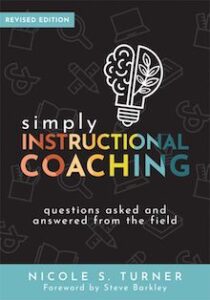Instructional Coaching’s Simple Path to Success
Simply Instructional Coaching: Questions Asked and Answered From the Field, Revised Edition
By Nicole S. Turner
(Solution Tree Press, 2022 – Learn more)
Reviewed by William R. Driscoll

Simply Instructional Coaching offers a glimpse of the pathway one might take from the classroom to a coaching role.

By dedicating the first half of the book to laying down a foundation and then focusing in the second half on building a growth mindset for improving instruction, she achieves her goal.
Turner organizes the chapters to unfold within those sections.
Part I: The Foundations of Instructional Coaching
- Understanding the Instructional Coaching Role
- Transitioning to the Instructional Coaching Role
- Staying Organized as an Instructional Coach
- Building Relationships and Trust with Teachers
- Supporting Your Teachers
Part II: The Tier, Coach, Grow Model
- Tiering Teachers for Support
- Coaching Teachers Using Coaching Cycles
- Growing Teachers Through Professional Development
A blueprint combining tech and artistry
Turner strikes a masterful balance between the technicality of Jim Knight and the artistry of Elena Aguilar by acknowledging the strengths of both theoretical frameworks. Her insight provides a third way for the reader by sketching out a blueprint to enact a transition plan that highlights the best of both approaches.
Each chapter follows the same formulaic approach of introducing a concept, following it with an example from Turner’s life, and highlighting a set of suggested steps to take as one moves into the role. Each section includes a helpful prompt for readers to reflect and write directly into the text that makes this book feel like one is engrossed in a coaching session.
Additionally, the clarity of the examples illustrate how Turner navigated managing workflow, handling the difficulty of speaking to administrators about requests, illuminating the uncertainty about defining responsibilities, asking questions of peers or faculty members that ignite change, and how to respond to passive or direct resistance. The result is that it offers the reader a useful and effective way to prepare for the next stage of one’s professional career.
The coach as communicator
The purpose of Turner’s anecdotes is that they are woven into the chapters to provide a map around potential traps and land mines that are inherent when coaching.
For example, Turner is at her best when revealing how she negotiated with her administrators to assure confidentiality was a part of the process of shifting a teacher’s mindset. However, she wisely added that coaches are most effective when they communicate clearly to teachers that the exception to confidentiality is when a teacher’s actions harm children. Simple, yet effective.
The intended audience of this SolutionTree publication may be teachers, but Turner offers thought provoking questions for administrators to consider as they assemble a coaching program. The result is that this is an ideal read for those looking for a pragmatic, yet not overly technical, analysis of instructional coaching. As Steve Jobs wrote, “It takes a lot of hard work to make something simple, to truly understand the underlying challenges and come up with elegant solutions. Simplicity is the ultimate sophistication.”
Dr. William R. Driscoll is the Dean of Faculty at Austin Preparatory in Reading, MA and an Adjunct Professor at the Boston College Lynch School of Education and Human Development. Bill enjoys reading and writing about educational leadership, organizational theory, and innovative design for learning. He lives with his wife Christie in North Brookfield, Massachusetts.































